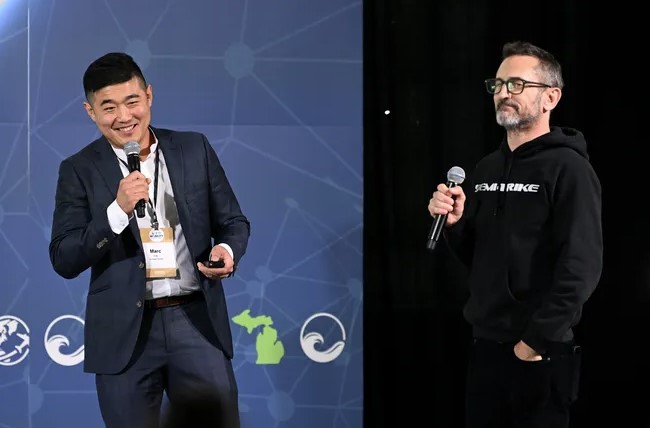Detroit — Civilized Cycles relocated from Brooklyn to Detroit last year to expand the light electric mobility venture, and it appears to be working.
They’re focused on launching a semi-trike, which resembles a mini semi-truck that’s designed for transporting goods at low speeds. Recently, the company vied for $100,000 in a pitch competition to help bring the product to market.
They won.
“This is overwhelming,” said Marc Liu, chief revenue officer of Civilized Cycles, shortly after the win. “Everybody knows how difficult it is as a startup, especially in hardware, but it’s exactly support like this — that’s why we’re here in Michigan. Not just the funding, but also the general culture.”
The competition sponsored by the Michigan Growth Office, called PitchMI, comes as many say the state needs to ramp up its financial support of startups. According to a recent report by the Citizens Research Council of Michigan, the state’s public investment in these initiatives lags other Great Lakes states — and experts familiar with the trend say that needs to change.
By analyzing funding relative to the size of each state’s economy, research found that Indiana and Ohio spend nearly three times as much on innovation-related programs than Michigan, while Pennsylvania invests about double according to the report. The only state lagging behind Michigan was Illinois, which until recently had been spending more than Michigan as well.
“The first takeaway from this analysis is clear,” said Bob Schneider, senior research associate for the Citizens Research Council. “We are not investing as much in innovation programs as our competitors in nearby states.”
There has been some recent movement to provide additional financial support for startups. In addition to the recent $100,000 PitchMI competition, other efforts include $5 million the Michigan Strategic Fund gave the Michigan University Innovation Capital Fund and Consortium. And $60 million is slated for the Michigan Innovation Fund through a one-time appropriation in the state’s 2025 fiscal budget. The funding is awaiting approval via bills in the Legislature, which officials and advocates expect will come by the end of the year.
Seeking to scale up funding
Mike Flanagan, vice president of Ann Arbor SPARK, said firms typically get their initial funding from personal savings, credit cards, and friends and family, with many entrepreneurs relying on these sources to cover early expenses related to research and development.
Once personal funds are exhausted, firms can tap state programs like Michigan’s Business Accelerator Fund for an early-stage grant.
Flanagan said that while there is a significant demand for early-stage funding, Michigan has lagged behind states like Ohio in developing a robust aid network. He said there needs to be more funding to bridge the gap between early-stage needs and when a company is ready to seek venture capital.
Ann Arbor SPARK became an administer of the Michigan Pre-Seed Capital Fund in 2007, awarding early-stage funds to tech firms, which it has been able to reinvest for the past five or six years, Flanagan said: “What we found is we’ve been able with some of the returns that came back from that … to recycle those returns into new startup investments.”
Ann Arbor SPARK expects to be among those to distribute money from the newly created Michigan Innovation Fund. “If we had more money in the early stage space,’ Flanagan said, “we could really generate more investments into these types of companies.”
The idea, he said, is “an evergreen fund concept,” with returns funneled back to early-stage funds, “rather than getting shipped off to New York or somewhere else where the original investors are from.”
“They come back to our funds, and then we can redeploy those to new Michigan startups,” Flanagan said. “So it kind of creates this evergreen cycle.”
According to the Citizens Research Council report, “State Entrepreneurial Ecosystems: How Public Policy Can Drive Economic Innovation,” Michigan invests $23.75 on innovation and entrepreneurship programs per $1 million in state gross domestic product compared to $67.95 in Ohio and $65.89 in Indiana per $1 million in state gross domestic product.
Schneider said without proactive public policy, the state risks seeing less research and development and innovation than it otherwise would.
“While we engage in substantial (research and development) and have excellent research institutions, the data suggests we are not getting as much bang for our buck when it comes to attracting venture capital and fostering new high-tech startups,” he said.
The report from the Citizens Research Council of Michigan notes that Michigan has revenue sources for economic development that could boost innovation and entrepreneurship programs. For example, the 21st Century Jobs Fund holds $250 million to $300 million and online gaming adds $17 million to $18 million annually to the Michigan Strategic Fund. The state’s Budget Stabilization Fund, which contributed $195 million to Detroit’s recovery, is expected to exceed $1.7 billion by fiscal year 2025.
“Redirecting these funds could more than double I&E appropriations,” the report suggests. The report also points to the Michigan Innovation Fund as an option to help provide the additional funding.
“This will be a positive kick — and a significant one — for innovation and entrepreneurship programming in Michigan,” Schneider said.
While the funding isn’t permanent, he said, “We have $60 million appropriated in the current budget for fiscal year 2025, and there’s probably at least another $50 million available for this program going forward.”
Schneider said the funding is not coming from this year’s tax dollars. Instead, it’s appropriated from the earnings and gains of an older initiative called the Venture Michigan Fund.
“Even though this funding is one-time, the effects will last for several years,” he said.
State Rep. Greg VanWoerkom, R-Norton Shores, was among three House members who had called for a bill package earlier this year that would have earmarked $105 million in funding for startups. He said the $60 million for the Michigan Innovation Fund is a good start and could lead to an ongoing effort if it proves successful.
“This is unique compared to what the state has done before, in that the organizations like Ann Arbor SPARK and Invest Detroit will be responsible for the money,” he said. “And they will then distribute the funds because the knowledge and expertise to understand whether a startup is legit, they are established entities that do this. These groups that do this every day will be the ones making decisions on these dollars.”
Once funding is approved through the Legislature and contracts are established with the Michigan Economic Growth Corp., the funds will become available for distribution, said Patti Glaza, executive vice president and managing director of Invest Detroit Ventures.
If Invest Detroit Ventures receives money, she added, it will go into the organization’s revolving fund. Officials will identify and evaluate potential venture-backed companies, conducting due diligence and presenting them to Invest Detroit Ventures’ investment committee. The process from start to finish typically takes about 60 days.
“We already have the infrastructure and processes,” she said. “We’re already distributing to entrepreneurs. This really just gives us additional capital to invest in the startups.”
There’s an absolute need in sectors including mobility, life science, software and climate tech, Glaza said: “We have a pipeline at any given time of 15 to 20 really good Michigan-based startups. We obviously can’t invest in them all. We don’t have that much money.”
Showcasing innovation
Michigan’s Growth Office recently conducted its first PitchMI, a “Shark Tank”-style competition that awarded Civilized Cycles $100,000.
Launched at the Mackinac Policy Conference, the PitchMI initiative was aimed at bolstering support for entrepreneurs within the state. Michigan’s Growth Office funded the effort, said Hilary Doe, Michigan’s chief growth officer.
“What you’re seeing now are really important first steps … to make sure that we’re supporting our entrepreneurs in every way we can,” she said.
The beauty of pitch competitions lies in their ability to showcase innovations, particularly in key areas like mobility, a sector that is vital to Michigan’s economy, Doe said: “It’s about creating that stage for entrepreneurs to show off the exciting work happening in the state and amplifying their companies.”
One of the key strategies emerging out of a recommendation from the Growing Michigan Together Council focuses on entrepreneurship. “We want to grow median incomes in our state, which is crucial for retaining and attracting talent,” Doe said.
The goal is to support local entrepreneurs so they can successfully fund their businesses without facing capital flight when they need to hire their first employees, she said. The $60 million earmarked for the Michigan Innovation Fund is a step in the right direction.
“I think we can always do more … because we know it’s so critical to driving median income growth and, frankly, driving population growth,” she said.
The lure of Detroit
Civilized Cycles, founded in 2017, operates out of Newlab. Company founder Zach Schieffelin moved from Brooklyn to Detroit to develop the company’s specialty in light electric mobility, focusing initially on e-bikes.
“Detroit is a fantastic place for building things,” Schieffelin said. “The ecosystem, businesses, talent, innovation, support all of those things make Detroit a really, really great place to actually build things.”
New York City is a wonderful place for finance and biotech but a challenging environment for manufacturing or engineering things, Schieffelin said. He described his experience in Detroit as “heaven” for builders, particularly appreciating local resources like a metal supermarket where he could find various materials.
“I was particularly blown away to come here and be able to go to like a metal supermarket, where you can buy all the metal and all the different sizes and shapes you can possibly want.”
The company’s semi-trike is designed as a compact e-bike resembling a small semi-truck for commercial goods transport. It can carry up to 800 pounds and has a cargo capacity of about 200 cubic feet, comparable to a standard van, while traveling safely at up to 15 miles per hour. It does not require a driver’s license and, with a starting price of $15,000, costs approximately one-fifth of what it takes to own and operate a gas-powered van.
Schieffelin said the platform offers a more efficient and safer solution for transporting goods in pedestrian-heavy or densely populated areas.
Marc Liu, the chief revenue officer of Civilized Cycles, said the company initially raised capital through friends and family, but securing traditional venture capital funding became challenging when they shifted focus to commercial cargo products. He said there’s often less investment interest in hardware startups. Prior to winning the recent PitchMI competition, they raised $2.5 million in investment capital and $500,000 in grants.
For the past year, the company has relied on grants from various entities in Michigan to fund product development and market entry, Liu said: “Michigan has been such a great home for us, because we’ve been able to sustain our development through a combination of grants. We’re very happy. We’d love to see more.”
Emil Nnani, founder and CEO of Boaz Bikes, said his company is looking to relocate operations to Newlab. Founded in 2018 and headquartered in Detroit, Boaz Bikes makes a seated scooter.
“We’re in a spot right now where we’re growing,” he said. “We’ve had amazing traction, nearly 500,000 rides to date and over 70,000 users.”
Nnani said he self-funded the venture, designed the product, built the prototype and app, and began raising capital in late 2018. The company has raised a little more than $2 million to date, which he says is pennies compared to competitors. He said he recently pitched the company on ABC’s “Shark Tank,” although he couldn’t share the results.
“Getting access to capital is tough,” he said. “Just getting in the right room with the right people. So those early years have been extremely tough trying to raise that capital. And now it’s getting exposed to these ecosystems, like this whole Newlab. I needed this four or five years ago, but I’m grateful I’m here now. I’m learning as much as possible, and trying to just get in the right rooms and talk to the right people that can write the check that can get us to the next level.”
Story by: cwilliams@detroitnews.com | @CWilliams_DN






